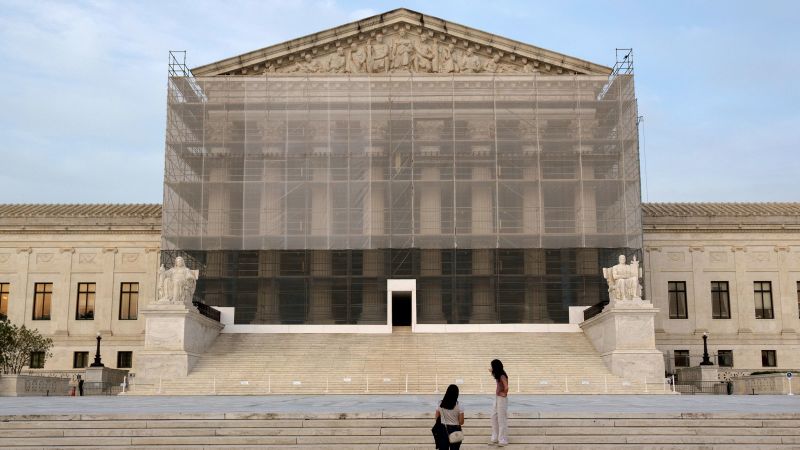The Supreme Court on Monday granted President Donald Trump’semergency requestto resumedeporting migrants to countries other than their homeland, including places like South Sudan, with minimal notice.
The decisionis a significant win for the Trump administration, which had argued that a lower court usurped its authority by ordering the Department of Homeland Security to provide written notice to the migrants about where they would be sent as well as an opportunity to challenge that deportation on the grounds that they feared being tortured.
The court’s three liberal justices – Sonia Sotomayor, Elena Kagan and Ketanji Brown Jackson – dissented.
The order pauses a decision from US District Judge Brian Murphy, which found that the government’s efforts to deport migrants to third-party countries without due process “unquestionably” violated constitutional protections.
Sotomayor said the court was “rewarding lawlessness” with its decision, asserting that the Trump administration has “openly flouted” previous court orders.
“Rather than allowing our lower court colleagues to manage this high-stakes litigation with the care and attention it plainly requires, this court now intervenes to grant the government emergency relief from an order it has repeatedly defied,” she said.
The court itself offered no explanation for the decision.
“It’s difficult to overstate how big a deal today’s ruling is, especially in conjunction with the Supreme Court’s two emergency docket rulings last month that, respectively, allowed the Trump administration to cancel temporary protected status for hundreds of thousands of Venezuelans and parole for hundreds of thousands of other migrants,” said Steve Vladeck, CNN Supreme Court analyst and a professor at Georgetown University Law Center.
“In those earlier rulings, the Court cleared the way for the government to treat as many as a million migrants as removable who previously weren’t. And today’s ruling allows the government to remove those individuals and others to any country that will take them—without providing any additional process beyond an initial removal hearing, and without regard to the treatment they may face in those countries.”
The case has drawn growing scrutiny after immigrant rights groups revealed that a group of migrants, initially bound for South Sudan, were beingdetained by the US at a military base in Djiboutiand have been unable to contact their attorneys. The migrants, including some from Cuba, Vietnam and Laos, were being held in a converted Conex shipping container.
Humanitarian groups describe the situation in South Sudan as dire. The United Nations recently warned aboutfood insecurity in the country, which is also facing political instability and escalating violence.
“These individuals are stranded incommunicado in Djibouti, a country of which they have no knowledge, and en route to another country, South Sudan, where none have ever set foot,” the National Immigration Litigation Alliance and other groups told the court.
In May, the 1st US Circuit Court of Appeals in Boston rejected the government’s request to pause a lower court ruling halting the policy, a decision that came amidreported plans to send migrants to Libya, a country widely criticized for mistreatment of detainees and ongoing civil unrest.
Libyan officials denied any agreement to accept deportees.
The Trump administration has argued that a lower court’s order requiring officials to give them an opportunity to claim fear of torture under federal law oversteps legal bounds and complicates foreign policy. The administration has also claimed that the migrants who were sent to third countries have significant criminal records and represent the “worst of the worst” of people in the US illegally.
But the migrants’ lawyers pushed back on that assertion this week, noting in a filing to the Supreme Court that many of the detainees have no criminal convictions, contrary to the administration’s characterization.
At issue is the Convention Against Torture, ratified by the Senate in 1994, that generally bars deportation or extradition to countries where there is a possibility that the migrant might be tortured. The law is vague about how an administration is supposed to make that determination and what process rights are due to the migrant at issue.
The Trump administration has said that in cases where it has received “assurances” from a foreign government that a migrant removed there will not be tortured, that officials do not have to notify a Cuban national, for instance, that he is being deported to South Sudan. In cases in which the government has not received those assurances, DHS policy requires the migrant to be notified so they can make a fear-of-torture claim.
The groups representing the migrants argued that the administration, in some cases, has provided less than 24-hours’ notice. Murphy, nominated to the bench by President Joe Biden, ruled that was insufficient, and he ordered the government to give migrants 10 days to raise a claim about fear of torture and 15 days after that to contest a denial of that claim. It is that timeline the Trump administration was fighting at the Supreme Court and had framed as a usurpation of “sensitive diplomatic, foreign-policy, and national-security efforts.”
Trump has filed more than a dozen emergency appeals at the Supreme Court and most of them – including several dealings with immigration – have been successful. A majority of the court supported Trump’s efforts to end temporary protected status for Venezuelan nationals, for instance, as well as the administration’s plan to unwind a form of humanitarian parole for Cubans, Nicaraguans, Venezuelans and Haitians.
However, the high court has also repeatedly shut down efforts by Trump to speed deportations without offering due process for the affected migrants. In perhaps the most notable example of that, the court ruled that the administration could not deport people under the 1798 Alien Enemies Act without giving them sufficient opportunity to contest their removability.
This story has been updated with additional details.
